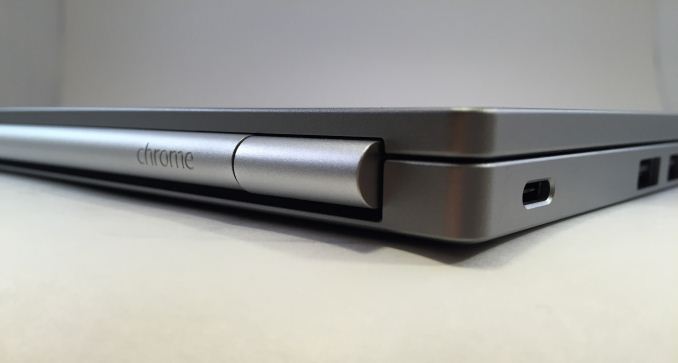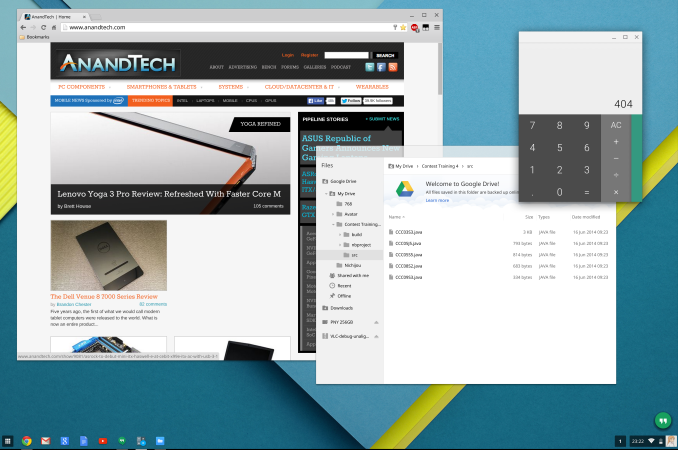The Chromebook Pixel (2015) Review
by Brandon Chester on March 16, 2015 8:00 AM EST- Posted in
- Laptops
- Chrome OS
- Chromebook
- Chromebook Pixel
Final Words
Despite its limitations, it's really hard to not like the Chromebook Pixel. Google has clearly put a lot of thought and effort into designing it, and what it does do it does really well. I think the move to USB Type-C is forward thinking, and makes the Pixel very versatile when it comes to connecting to both current and future displays and peripherals. The little details like tapping the top to see the remaining battery capacity, and the ability to charge on either side also help make it a very lovable laptop.
The Pixel's hardware is top notch. The build quality is every bit as good as what you'll get on a MacBook Retina, and both the keyboard and touchpad are comfortable to use. The CPU and RAM are completely overkill for running Chrome OS, but given that the Pixel has absolutely stellar battery life I'm not complaining about the additional hardware power. I think Google could have done more to calibrate the display, but in all honesty I doubt any users who buy the Pixel will be bothered by it, and it is still incredibly sharp.
The only big criticism I can really throw at the Pixel is the fact that its software is limited. But that is the entire point of how Chrome OS has been designed, and I do not know if it really makes sense to complain about something doing exactly what it was intended to do just because you wish it could do more. Chrome OS is definitely not the OS for everyone though, and although you can run other versions of Linux overtop, it's not exactly a real solution to the problem.
The final question is obviously whether or not someone interested in the Pixel should buy one. The answer is more complicated than a yes or a no. For anyone who wants to develop with Chrome OS in mind, the Pixel is the laptop to buy if it is within their budget. Other Chromebooks are definitely more affordable, but the Pixel is just so much nicer than any other Chromebook. I think that the Pixel can also be an appealing device for any user who can work within the limitations of Chrome OS, although I heavily stress that buyers make sure they know exactly what those limitations are before they spend $1000 on a laptop.
Google clearly doesn't intend for the Pixel to be a mass market item. It's quite expensive, it runs Chrome OS, and it's only sold in the US and the UK. There's clearly a small market for people that want a laptop like the Pixel though, and those are the people that Google are targeting. I am not one of them, and I do not know many people who are, but they do exist. In the end I find myself wishing that the Pixel could do more, because it's a genuinely nice laptop. I really like the Chromebook Pixel, but I personally just couldn't justify buying it.












123 Comments
View All Comments
jabber - Wednesday, March 18, 2015 - link
I must say if I wasn't in the realm of Windows support I'd dump all my computing gear and buy a Pixel in a heart beat. I have a little 11" Samsung Chromebook and I love it. I must say I'm aghast at the level of ignorance on this and many tech sites regarding the Pixel and ChromeOS in general.uhuznaa - Monday, March 16, 2015 - link
Executive ChromeBook.ATC9001 - Monday, March 16, 2015 - link
Is it possibly to remove the SSD and put in another one and dual boot windows?...or just windows only?999 is decent, add 100/200 for a 256/512 SSD and you get a pretty solid machine for a reasonable price. Would be interesting to see this compared to say an XPS 13 or similiar
edhburns - Monday, March 16, 2015 - link
My assumption is that it is not possible to remove the SSD. The previous version was soldered down. Although I haven't seen any reviews of this device where anyone opened up the inside to find out. So time will tell.chlamchowder - Monday, March 16, 2015 - link
If you're going that route, you might as well get a Surface Pro 3 + type cover for about the same price. You're also guaranteed that the hardware is supported in Windows.iniudan - Monday, March 16, 2015 - link
Cannot boot Windows has they use Coreboot as their boot firmware.Of course if you were willing to load a payload to Coreboot it could be possible, in theory, but you would have to disable Chromebook secure boot first, which is a bit more involved then the UEFI equivalent.
iniudan - Monday, March 16, 2015 - link
And let not forget all the possible driver problem once you boot Windows.Uplink10 - Monday, March 16, 2015 - link
Other Linux distributions clearly beat Chrome OS with their wide range of software and hardware is an overkill for this notebook.chlamchowder - Monday, March 16, 2015 - link
They should put in a 256 GB SSD and ship it without an OS for the same price.cjb110 - Tuesday, March 17, 2015 - link
I think they hope someone else will...Google isn't interested in making PC's. Do we know who made it for Google? Maybe they could be convinced.